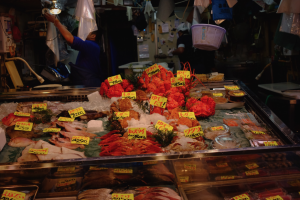Growing up in Japan, seafood was a big part of my food culture. In fact, 23% of Japanese person’s protein intake comes from the ocean, almost 3 times that of average of an American. However, the article by Ocean Wise made me realized that sustainable seafood supply is not as common compared to countries like Canada.

In recent years, fishery depletion has become a global issues. This is especially true in Japan as fish stocks are at risk mainly because of overfishing done over decades. Total catch in 1994 was approximately 6 million tons while in 2011 only half of the amount (3.8 million tons) was caught. This also caused decline in fisheries’ earnings from $1.6 trillion in 2006 to $1.5 trillion in 2015. Japan is also often criticized for continuously hunting whales, which was banned by the International Whaling Commission in 1994. Japan up to now has somehow found ways to continue catching whales as this still continues today. It was recently reported that Japan has captured 177 whales through out this year and this was subject to many criticisms from all over the world. This is one factor among many which leads people to state “Japan is probably 10 years behind the U.S. and E.U. markets in terms of sustainability.”
In recent years, multiple programs have been initiated in order to tackle these issues. For example, single species and eco-based managements are now common approach to fisheries management in Japan. Major retailers in Japan have also started to implement similar initiatives to address and solve these issues. AEON, one of such major Japan based retailer recently announced its goal to have 10% of their seafood sales to come from fisheries certified by the Marine Stewardship Council (MSC) and Aquaculture Stewardship Council (ASC).
I do agree that fishery industry in Japan has much to do in order to make the industry more sustainable. However as explained in this article, it is important to note that basic concept of sustainability is different between Japan and Western nations including U.S., Canada, and Europe. It would be difficult to adopt the same strategies which may have worked in the western countries to Japan and expect the exact same results in Japan. It is important to acknowledge that definition of sustainability may differ between countries and cultures as with each individual. I hope Japan will continue to make good progresses in establishing its own unique process and system to supply sustainable seafoods.